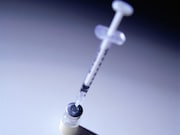Compared with those who receive oral therapy, caregivers miss more work, have lower QoL scores
WEDNESDAY, April 17, 2019 (HealthDay News) — The overall burden of outpatient parenteral antimicrobial therapy (OPAT) is substantially higher than that of oral therapy for caregivers of children on prolonged antimicrobial therapy after hospital discharge, according to a study published in the April issue of Hospital Pediatrics.
Nathan M. Krah, Ph.D., from the University of Utah in Salt Lake City, and colleagues compared the economic burden between OPAT and oral therapy while accounting for direct and indirect costs and caregiver quality of life (QoL).
Based on survey responses from 212 caregivers, the researchers found that 58 percent of children on prolonged antimicrobial therapy after discharge were given oral therapy and 42 percent were given OPAT. For children receiving OPAT, caregivers missed more work, children missed more school, time with daily medication administration was longer (90 versus six minutes), and QoL scores were lower compared with those receiving oral therapy. For OPAT, the mean daily cost was $65 versus $7 for oral therapy.
“These findings strongly support efforts to use oral therapy in place of OPAT when clinically appropriate,” the authors write.
Copyright © 2019 HealthDay. All rights reserved.








